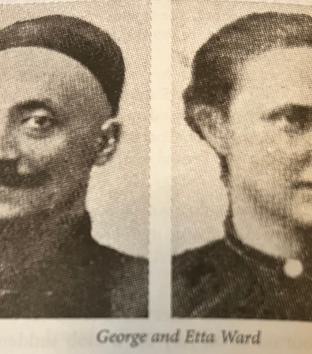
???? — 1900
George and Etta Ward
Missionary martyrs of the Boxer Uprising
Brought up in a wealthy English family, George Ward found Christ in 1890 during a meeting at the London YMCA. From the start the fruit of his salvation expressed itself in good works, and before long he was burdened by the needs of the mission field. Ward applied to the CIM, offering to meet all his own expenses if the board accepted him. He accompanied David and Agnes Thompson to China in 1893, and after a time of language study he settled at Changshan in western Zhejiang.
Etta Fuller hailed from the American state of Iowa. She was orphaned at an early age when her parents passed away, but she found Christ at the age of 12 and later attended the Minneapolis Training Institute, departing for Zhejiang Province as a missionary in 1894. For the first three years she worked at Changshan, where her inner charm and beauty attracted the interest of George Ward. After their marriage in 1897, the Wards experienced a surge in their work, and in two years the number of Christians in Changshan doubled. In 1899, the arrival of a baby boy, Herbert, added to their joy.
On July 20, 1899, a friendly local magistrate advised George Ward to flee [from the advancing Boxers], for he could no longer guarantee the family’s protection. Ward thought he should remain at his post, but made arrangements for his wife, five-month-old son Herbert and single missionary Emma Thirgood to leave for the coast the next morning. Ward didn’t believe there was any serious danger, and he promised his wife that if an attack on the city was launched he would leave immediately.
Etta Ward, her little son Herbert, and Emma Thirgood left Changshan by boat on the afternoon of July 21. By evening they had only managed to travel about ten miles (16 km) from Changshan when they looked back and saw a red glow in the sky above the town. They assumed the Boxers had arrived and were burning the city, so they proceeded toward Quzhou, arriving at dawn the following day. The city was in an uproar due to the massacre of the Thompson family and other missionaries, and the boatmen refused to take the two women and child any further. Taking the missionaries’ baggage, they threw it onto the riverbank and ordered them to get off the vessel.
The besieged trio waited at the water’s edge for a long time, until a boatman offered to take them to Hangzhou. They were relieved, but as they placed their luggage on the boat the same mob that had viciously killed the Thompsons arrived at the riverbank. Some of them demanded money, at which Etta Ward took off her wedding ring and offered it to her persecutors. The leader snatched it from her and sneered, “we want your life, not your gold rings.” Etta was suddenly
stabbed in the arm, and with a push she fell on her side. The crowd then seemed to fade from her sight, and all she saw was her babe, needing to be fed from her breast, and drawing the helpless infant to her she pressed it to her bosom. The fiends then stabbed mother and child together, and with the next blow severed the mother’s head from her shoulders and so ended their sufferings together.
George Ward, meanwhile, had escaped on foot with a Chinese evangelist and a servant name Li Yun. Traveling along small trails in an effort to escape detection, the trio were untroubled until the following afternoon, when they stopped at a village about 5 miles (8 km) from the city. When a hostile crowd surrounded them, Ward pushed past the mob and ran along a path, only to find that it came to a dead end at a pond. His assailants laughed at him as he returned; then:
they set upon and beat Ward and his servant to death with sticks and clubs, and left the evangelist on the ground, also supposing him to be dead. He was not, however, even insensible, but saw all that was going on, and in the night crawled to a place of safety and afterwards recovered.
Attribution
Paul Hattaway
Sources
Taken by permission from Paul Hattaway, Zhejiang: The Jerusalem of China. Volume Three of The China Chronicles: Inside the Greatest Christian Revival in History. London: Society for Promoting Christian Knowledge and Asia Harvest, 2019.
Quotations within the text are from Ralph Coventry Forsyth (ed.) The China Martyrs of 1900: A Complete Roll of the Christian Heroes Martyred in China in 1900, with Narratives of Survivors. London: The Religious Tract Society, 1904, 94-95.
About the Author
Paul Hattaway is the international director of Asia Harvest, an organization committed to serving the church throughout Asia. He is an expert on the Chinese church and author of the The Heavenly Man and Back to Jerusalem.



